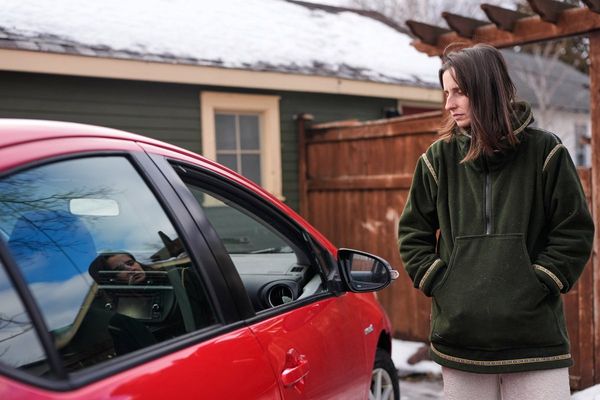
Vice President Kamala Harris struck a defiant tone as Democrats’ bid to pass voting rights reforms failed to pass the Senate late Wednesday evening.
“We are not giving up,” Ms Harris told The Independent. “We will not give up.”
The Senate failed to pass voting rights on a 49 to 51 basis with Senate Majority Leader Chuck Schumer voting against it so as to bring up the bill later this year.
Speaking to reporters earlier she said: “I’m here tonight because this is a historic night, and history is going to record – and watch, certainly – the votes that are taking place.
“This is about the fundamental freedom to vote and what should be an unfettered access to the ballot. I’m here to make a very strong statement that this is, whatever happens tonight and the outcome of this vote, the president and I are not going to give up on this issue.
“This is fundamental to our democracy and it is non-negotiable.”
Later in the evening, Mr Schumer called a vote for a talking filibuster, which ultimately failed with conservative Democratic Sens Kyrsten Sinema and Joe Manchin voting with Republicans. Both Senators had ruled against the idea of a change.
The vote came after President Joe Biden called for a change to the rules on the filibuster and Mr Schumer had called for a rules change as well.
But it was not without fireworks, as Senate Minority Leader Mitch McConnell, who had taken umbrage at Mr Biden saying that voting against voting rights would put people on the side of segregationists, lashed out at Democrats for trying to change the Senate’s rules.
“The president of the United States and the Majority Leader of the Senate have made breaking the Senate a central part of their plan for America,” he said on the floor.
On Thursday morning, NBC News pressed Ms Harris on whether the administration believed the 2022 midterm election would not be “free or fair” if voting rights didn’t pass. Ms Harris responded by saying: “What we are looking at, and the topic of so much debate last night, was that we as America cannot afford to allow this blatant erosion of our democracy and in particular the right of all Americans who are eligible to vote to have access to the ballot unfettered.”
Despite the fact the vote was expected to fail, it was not without its controversies. Sen Jon Ossoff, the freshman Senator from Georgia whose victory gave Democrats their majority, slammed Republican senators who voted for the reauthorisation of the Voting Rights Act in 2006 but would not do so now.
“For decades, the reauthorisation of the Voting Rights Act was bipartisan,” he said before rattling off Republicans who voted to reauthorise the bill such as Sen John Cornyn from Texas or Sen Susan Collins of Maine and cited their previous support.
But Ms Collins, who won reelection in 2020 in a state Mr Biden won, took umbrage with Mr Ossoff, who is 34.
“I'm not sure the senator from Georgia was even born in 1965,” she said and cited the Senate’s rule which prohibits the impugning the integrity and motives of other Senators.
The move bookends attempts to honor the late Martin Luther King’s birthday by passing a reauthorisation of the Voting Rights Act. The John R Lewis Voting Rights Advancement Act passed the House of Representatives earlier this month and was named for fellow civil rights activist and former Rep John Lewis, whose nonviolent protest in Selma, Alabama in 1965 galvanised support for voting rights.
Georgia’s junior Democratic Senator Raphael Warnock, who preaches at Ebenezer Baptist Church where Dr King preached and was Mr Lewis’s pastor, said Democrats would continue to fight for voting rights.
“The other day I was getting on a plane, headed up here, and while I was sitting there, a flight attendant handed me a napkin, and I looked at it and it said, ‘thank you for fighting the good fight,’” Mr Warnock told The Independent. “So for her and all of the citizens of Georgia, I’m going to keep fighting.”
Mr Warnock won a runoff for a special election in 2021 and is up for re-election to a full term in November and is facing former University of Georgia football running back Herschel Walker.
“We are going to win,” he said.
But Senator Patrick Leahy of Vermont, who is retiring at the end of this year, said “I don’t know” when asked whether Democrats would have another opportunity to pass voting rights.
The failure to pass voting rights likely means that Democrats will have to focus on passing parts of Mr Biden’s proposed Build Back Better bill. Mr Manchin announced in December that he was a no on the legislation, which includes an expanded child tax credit, home care for people with disabilities and elderly people, provisions to combat climate change, child care and early childhood education.
Mr Biden told reporters that it was likely that the bill would need to be broken up.
“I'm confident we will get pieces, big chunks, of the Build Back Better law signed into law,” he said.
Senate Budget Committee Chairman Bernie Sanders said the next course of action was to pass a “strong” Build Back Better bill and that it if that doesn’t pass, then he would come back with strong individual legislation on tax reform, prescription drugs and climate change.
“But it’s very important for the American people to understand that at least 48 of us are prepared to fight for working families,” he told reporters. “Manchin will do what he do and he is going to have to explain his votes to the people of West Virginia.”
Earlier this week, Mr Sanders, who has in the past supported primary challengers in House races, expressed openness to primary challengers against Mr Manchin and Ms Sinema.
Republicans for their part breathed a sigh of relief that the filibuster survived.
“Obviously the filibuster is the feature of the Senate that protects the rights of minority and gives a voice to minority in this country,” Senate Minority Whip John Thune told The Independent.
Republicans only need to win one seat to tilt the Senate in their favor in November. Mr Thune said that Republicans would preserve the filibuster and cited how former president Donald Trump urged Republicans to ditch the filibuster.
“If the Dems figure out a way to blow it up between now and then, then obviously we’ll play under those rules, but no,” he said. “As we demonstrated the last time President Trump tried to convince Republican Senators to do this, we resisted for all the reasons that we talked about.”
Senator Roger Wicker of Mississippi laughed at the idea of Republicans getting rid of the filibuster.
“After fighting as hard as we fought, after standing up to our own president of our party, would we do away with the filibuster? No,” Mr Wicker told The Independent.
Conversely, when asked about whether Republicans would do away with the filibuster, Senator Ted Cruz of Texas, who last week expressed openness about changing the filibuster if Democrats change it, simply closed the elevator door.







